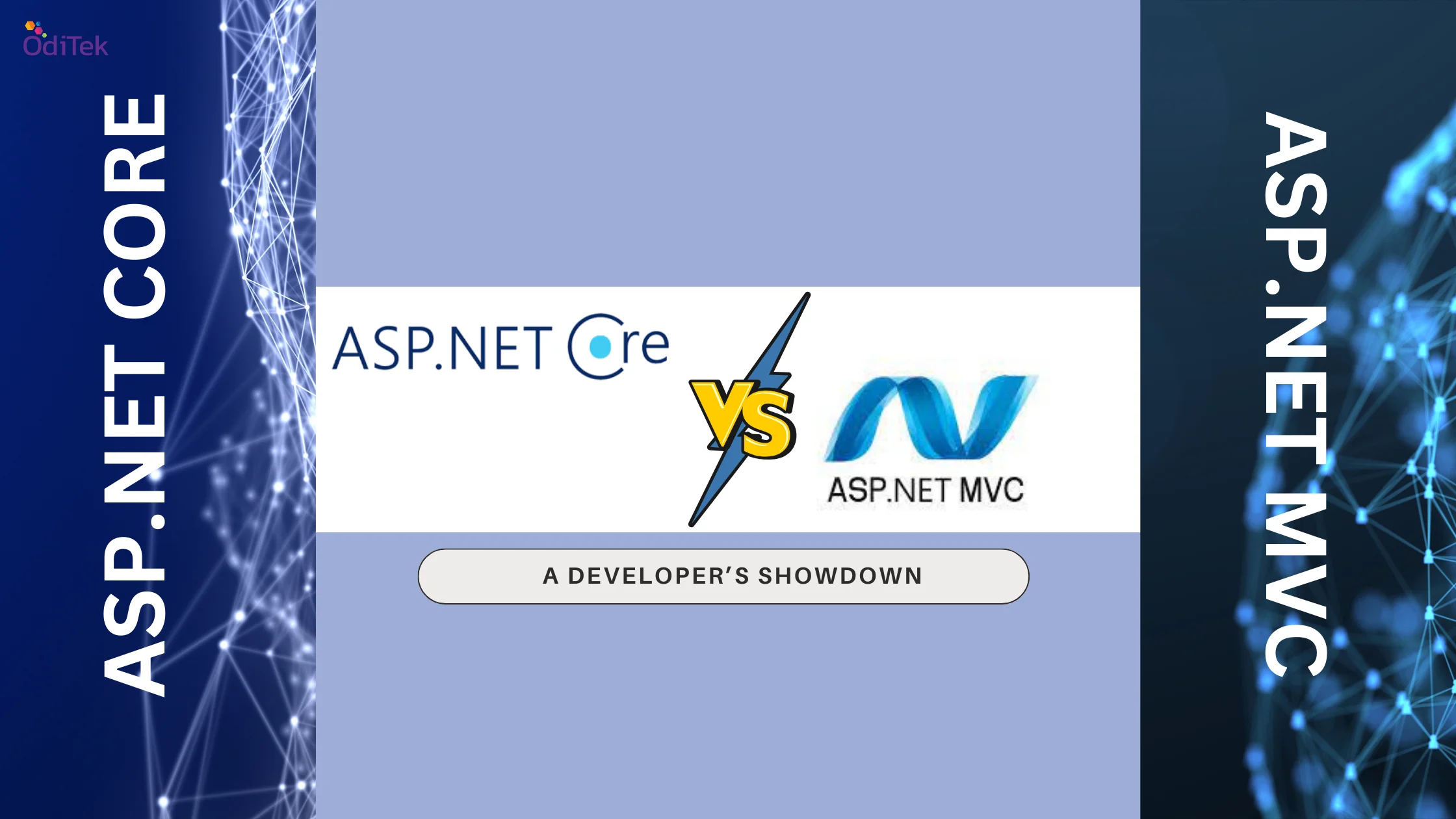The world of web development is a dynamic arena, constantly evolving with new frameworks and technologies vying for your attention. When it comes to building robust web applications, two names stand out: ASP.NET MVC and its younger sibling, ASP.NET Core MVC. But which one deserves a place on your development team? Let’s delve into the ring and compare these MVC titans to help you choose the right champion for your project.
ASP.NET Core
ASP.NET Core stands as a transformative and dynamic open-source framework crafted by Microsoft, representing a leap forward in web development capabilities. This framework, born from the robust foundation of ASP.NET, embraces the principles of modularity, cross-platform functionality, and an open-source ethos.
The open-source nature of ASP.NET Core encourages community collaboration and innovation. Developers have access to the framework’s source code, enabling them to contribute improvements, report issues, and gain deeper insights into the inner workings of the framework. This collaborative environment fosters a vibrant ecosystem of extensions, middleware, and NuGet packages, enriching the toolkit available to developers.
ASP.NET Core finds its application in a variety of scenarios, ranging from traditional web applications to modern cloud-native solutions. With its support for creating web applications, services, mobile backends, and Internet of Things (IoT) applications, ASP.NET Core positions itself as a versatile framework catering to the evolving needs of contemporary software development.
In essence, ASP.NET Core transcends the boundaries of its predecessor, offering a forward-looking, cross-platform, and modular framework that empowers developers to craft innovative, cloud-enabled, and internet-connected applications. As organizations increasingly embrace diverse technological landscapes, ASP.NET Core emerges as a strategic choice for building robust and scalable solutions that can thrive in the ever-changing world of software development.
ASP.NET MVC
ASP.NET MVC, an integral part of Microsoft’s ASP.NET framework, stands as a powerful and time-tested web development paradigm. Renowned for its structure, ASP.NET MVC, or Model-View-Controller, provides a well-defined architectural pattern that aids in the creation of scalable and maintainable web applications.
In the realm of ASP.NET MVC, the model represents the application’s core logic and data, the view handles the user interface, and the controller orchestrates the interaction between the model and the view. This separation of concerns enhances code organization, making it more modular and conducive to efficient collaboration among development teams.
ASP.NET MVC embraces the principles of convention over configuration, offering a default set of conventions that simplifies development while allowing for customization when needed. This convention-based approach streamlines the coding process, enabling developers to focus on building features rather than dealing with excessive configuration details.
While ASP.NET MVC initially adhered to the .NET Framework, it is important to note that with the introduction of ASP.NET Core, there is now a choice between the classic ASP.NET MVC and the modern ASP.NET Core MVC, each catering to distinct development scenarios.
Let’s delve into the ring and compare these MVC titans to help you choose the right champion for your project.
Round 1: Platform Performance
ASP.NET MVC: This veteran is exclusive to Windows, leveraging the .NET Framework. While mature and stable, it lacks the flexibility of its opponent.
ASP.NET Core MVC: This modern warrior is a cross-platform champion, flexing its muscles on Windows, Linux, and macOS thanks to the lightweight .NET Core runtime. This opens doors to diverse deployment options.
Round 2: Lightweight Agility
ASP.NET MVC: Built on the shoulders of the .NET Framework, it carries some weight. While powerful, it can feel hefty compared to its leaner counterpart.
ASP.NET Core MVC: Designed for agility, it sheds unnecessary baggage, resulting in a smaller footprint and faster performance. This translates to quicker development cycles and improved user experiences.
Round 3: Dependency Injection Prowess
ASP.NET MVC: While not built-in, dependency injection can be added for better testability and maintainability.
ASP.NET Core MVC: Embraces dependency injection as a core principle, simplifying unit testing and promoting loose coupling for cleaner code.
Round 4: Modernity and Community
ASP.NET MVC: While mature, it faces limited future development due to Microsoft’s focus on Core.
ASP.NET Core MVC: Actively developed and embraced by the community, it benefits from continuous improvements and a vibrant ecosystem of libraries and tools.
Moreover, .NET Core presents an array of compelling features that position it as an optimal choice for web development. These features include:
1. Unified Programming Model
.NET Core provides a cohesive programming model suitable for both MVC and Web API development. This unified approach streamlines development workflows and promotes consistency across different aspects of a web application.
2. Tag Helpers
Introducing a seamless way to generate HTML elements within views, Tag Helpers enhance the readability and maintainability of code. This feature simplifies the process of creating dynamic and interactive user interfaces.
3. View Components
ASP.NET Core incorporates View Components, empowering developers to encapsulate and reuse UI logic. This modular approach enhances code organization, facilitating the creation of more modular and maintainable applications.
4. Visual Studio IDE Integration
Boasting complete integration with the Visual Studio Integrated Development Environment (IDE), ASP.NET Core offers a developer-friendly experience. This integration enhances productivity by providing a robust set of tools for coding, debugging, and project management.
5. Built-in Dependency Injection Support
ASP.NET Core natively supports dependency injection, fostering a more modular and testable codebase. This built-in capability simplifies the management of component dependencies, contributing to improved application maintainability.
6. Compatibility with Popular JavaScript Frameworks
Recognizing the diversity of the JavaScript ecosystem, ASP.NET Core seamlessly integrates with all popular JavaScript frameworks. This flexibility allows developers to choose the front-end technology that best suits their project requirements.
7. Enhanced Project Folder Hierarchy
ASP.NET Core introduces a refined project folder hierarchy, promoting a clearer and more organized structure. This enhancement aids developers in navigating and managing project files efficiently.
The collaborative nature of .NET Core development enables developers to actively contribute to technological advancements and customize the framework according to the specific needs of their applications. This flexibility empowers developers to craft robust web solutions, making ASP.NET Core an excellent choice for a diverse range of projects. Now, let’s delve into the compelling reasons why ASP.NET Core stands out as an exceptional choice for your next development endeavor.
Choosing between ASP.NET MVC and ASP.NET Core involves considering factors such as feature completeness, performance, and project requirements. Here’s a comprehensive breakdown to guide your decision:
When to Choose ASP.NET MVC
Opting for ASP.NET MVC is generally limited to scenarios where you have an existing application built on this framework, and a rewrite is not a feasible option. If you’re dealing with legacy code or constraints that make migration challenging, maintaining the status quo with ASP.NET MVC may be the pragmatic choice. However, it’s essential to note that ASP.NET Core MVC is considered feature-complete and outperforms ASP.NET MVC in terms of speed and resource efficiency.
In summary, stick with ASP.NET MVC only if:
• You have an existing application built on ASP.NET MVC.
• A complete rewrite is impractical or not feasible due to specific constraints.
When to Choose ASP.NET Core
ASP.NET Core emerges as the preferred choice for new projects and modern web development endeavors. Its lean and composable framework, coupled with enhanced performance, makes it the go-to option. If you’re embarking on a fresh project, the recommendation is unequivocal: choose ASP.NET Core. It not only offers feature completeness but does so in a more lightweight and faster manner compared to ASP.NET MVC.
Key considerations favoring ASP.NET Core include:
• Starting a new project, where you can leverage the advantages of a modern, performant framework.
• The need for a lightweight and composable architecture.
• Desire for improved performance compared to ASP.NET MVC.
Migration from ASP.NET MVC to ASP.NET Core MVC
If you currently have an ASP.NET MVC project, the decision to migrate to ASP.NET Core should be based on your project’s specific needs and long-term goals. Rewriting an existing project may not be mandatory unless you seek to capitalize on the performance enhancements offered by ASP.NET Core MVC. It’s a strategic decision that hinges on factors like project complexity, resource availability, and the desire to adopt a more modern and efficient framework.
In essence, consider ASP.NET Core if:
• Starting a new project or undertaking a major upgrade.
• Seeking enhanced performance and a more modern architecture.
Ultimately, the choice between ASP.NET MVC and ASP.NET Core should align with your project’s context, taking into account the existing codebase, development goals, and the desire for improved performance and modern development practices.
Conclusion
OdiTek Solutions possesses proficient expertise in both technologies, ensuring seamless alignment with your specific needs and requirements. Contact us today to initiate the enhancement of your web presence and bring your digital aspirations to fruition. Our team stands ready to provide tailored solutions that cater to the unique demands of your project.







